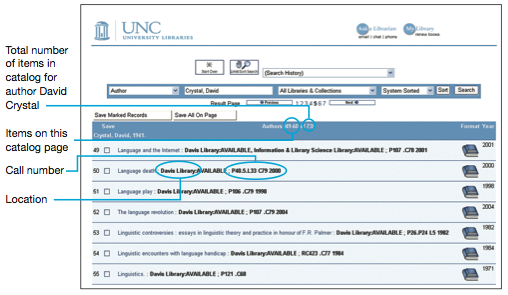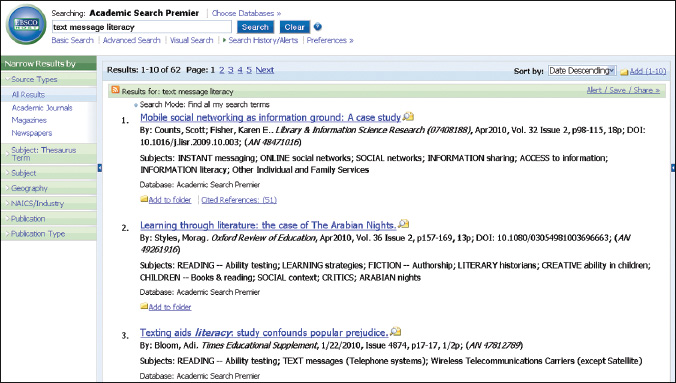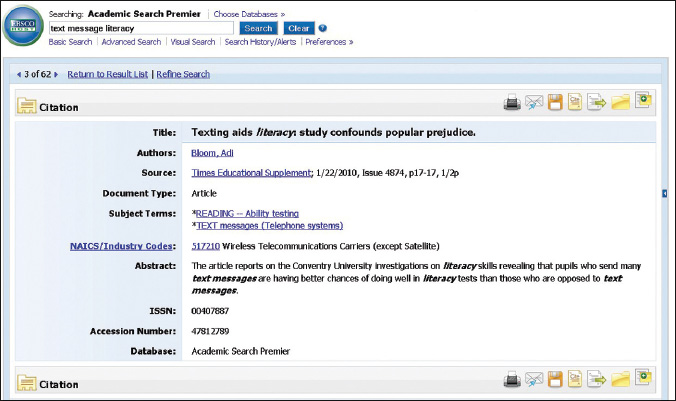16cFind library resources.
The library is one of a researcher’s best friends, especially in an age of digital communication. Your college library houses a great number of print materials and gives you access to electronic catalogs, indexes, and databases. Check your library’s Web site or ask a librarian for an introduction to the available resources.

Search options
The most important tools your library offers are its online catalog and databases. Searching these tools will always be easier and more efficient if you use carefully chosen words to limit the scope of your research.
SUBJECT WORD SEARCHING
Catalogs and databases usually index their contents not only by author and title but also by subject headings—standardized words and phrases used to classify the subject matter of books and articles. (For books, most U.S. academic libraries use the Library of Congress Subject Headings, or LCSH, for this purpose.) When you search the catalog by subject, you need to use the exact subject words.
KEYWORD SEARCHING
Searches using keywords, on the other hand, make use of the computer’s ability to look for any term in any field of the electronic record, including not just subject but also author, title, series, and notes. In article databases, a keyword search will look in abstracts and summaries of articles as well. Keyword searching is less restrictive, but it requires you to put some thought into choosing your search terms in order to get the best results.
ADVANCED SEARCHING
Many library catalogs and database search engines offer advanced search options (sometimes on a separate page) to help you combine keywords, search for an exact phrase, or exclude items containing particular keywords. Often they limit your search in other ways as well, such as by date, language, country of origin, or location of the keyword within a site.
Many catalogs and databases offer a search option using the Boolean operators and, or, and not, and some allow you to use parentheses to refine your search or wildcards to expand it. Note that much Boolean decision making is done for you when you use an advanced search option (as on the advanced search page shown above). Note, too, that search engines vary in the exact terms and symbols they use to refine searches, so check before you search.
- and limits your search. If you enter the terms messaging and language and literacy, the search engine will retrieve only those items that contain all the terms. Some search engines use a plus sign (+) instead of and.
- or expands your search. If you enter the terms messaging or language, the computer will retrieve every item that contains the term messaging and every item that contains the term language.
- not limits your search. If you enter the terms messaging not language, the search engine will retrieve every item that contains messaging except those that also contain the term language. Some search engines use a minus sign (–) or and not instead of not.
- Parentheses customize your search. Entering messaging and (literacy or linguistics), for example, will locate items that mention either of those terms in connection with messaging.
- Wildcards expand your search. Use a wildcard, usually an asterisk (*) or a question mark (?), to find related words that begin with the same letters. Entering messag* will locate message, messages, and messaging.
- Quotation marks narrow your search. Most search engines interpret words within quotation marks as a phrase that must appear with the words in that exact order.
Books
The library catalog lists all the library’s books.
CATALOG INFORMATION
Library catalogs follow a standard pattern of organization, with each holding identified by three kinds of entries: one headed by the author’s name, one by the title, and one or (usually) more by the subject. If you can’t find a particular source under any of these headings, you can search the catalog by using a combination of subject headings and keywords. Such searches may turn up other useful titles as well.
Catalog entries for books list not only the author, title, subject, and publication information but also a call number that indicates how the book is classified and where it is shelved. Many online catalogs allow you to save the information about the book while you continue searching and then retrieve the call numbers for all of the books you want to find in one list. Once you have the call number for a book, look for a library map or shelving plan to tell you where the book is housed. Take the time to browse through the books near the call number you are looking for. Often you will find other books related to your topic nearby.
Following is a page of results for noted linguist and author David Crystal. Many electronic catalogs indicate whether a book has been checked out and, if so, when it is due to be returned. Sometimes you must click on a link to check the availability of the book.

BOOK INDEXES
Indexes can help you quickly locate complete bibliographic information on a book when you know only one piece of it—the author’s last name, perhaps, or the title. Indexes can also alert you to other works by a particular author or on a particular subject. If you are looking for an older book, you may find the information you need in a print index rather than in an electronic database.
REVIEW INDEXES
A review index will help you find reviews of books you are interested in so that you can check the relevance of a source or get a thumbnail sketch of its contents before you track it down. For reviews more than ten years old, you will generally need to consult the print version of the index.
Periodical articles
Titles of periodicals held by a library appear in its catalog, but the titles of individual articles do not. To find the contents of periodicals, you will need to use an index source.
PERIODICAL INDEXES
Periodical indexes are databases or print volumes that hold information about articles published in newspapers, magazines, and scholarly journals. Different indexes cover different groups of periodicals. Ask a reference librarian for guidance about the most relevant index for your topic.
General indexes of periodicals list articles from general-interest magazines (such as Time or Newsweek), newspapers, or a combination of these. General indexes usually provide current sources on a topic, but you may need to look further for in-depth articles.
Many disciplines have specialized indexes and abstracts to help researchers find detailed information. To use these resources most efficiently, ask a reference librarian for help.
Some electronic periodical indexes offer the full text of articles and some offer abstracts (short summaries) of the articles. Be sure not to confuse an abstract with a complete article. Full-text databases can be extremely convenient—you can read and print out articles directly from the computer, without the extra step of tracking down the periodical in question. However, don’t limit yourself to full-text databases, which may not include the sources that would benefit your research most. Databases that offer abstracts give you an overview of the article’s contents that can help you decide whether you need to spend time finding and reading the full text.


To locate an indexed article that seems promising for your research project, you can check the library catalog to see whether the periodical is available electronically and, if so, whether your library has access to it. Using the library computer network for access can help you avoid paying to view the text of the article that is available online only for subscribers or for a fee.
If the periodical is not available electronically (some scholarly journals, for example, are not), the library catalog also will tell you whether a print version is available in your library’s periodicals room. This room probably has recent issues of hundreds or even thousands of newspapers, magazines, and scholarly journals, and it may also contain bound volumes of past issues and microfilm copies of older newspapers.
Bibliographies
Bibliographies (lists of sources) in books or articles you are using for your research can lead you to other valuable resources. In addition, check with a reference librarian to find out whether your library has more extensive bibliographies devoted to the area of your research.
Other library resources
In addition to books and periodicals, libraries give you access to many other useful materials that might be appropriate for your research.
- Special collections and archives. Your library may house archives (collections of valuable papers) and other special materials that are often available to student researchers.
- Audio, video, multimedia, and art collections. Many libraries have areas devoted to media and art, where they collect films, videos, paintings, and sound recordings.
- Government documents. Many libraries have collections of historical documents produced by local or state government offices. You can also look at the online version of the U.S. Government Printing Office (GPO Access) for electronic versions of government publications from the past decade or so.
- Interlibrary loans. To borrow books, videos, copies of journal articles, or audio materials from another library, use an interlibrary loan. Some loans can take time, so be sure to plan ahead.